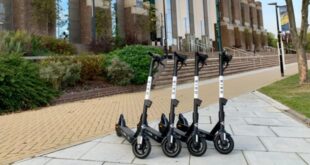The UK Government has updated its guidance on e-scooter trials, as all scooters will now have to have a visible number plate.
On February 22, the Department for Transport and Active Travel England published an update to its e-scooter trial guidance document, setting out changes that come into effect on April 1.
The changes, which only apply to local authorities taking part in the trial extension to November 30th 2022, include rules on unique identification numbers (UIN) and suggestions for safety improvements and action to tackle illegal e-scooter use.
In the update, the guidance document, titled ‘E-scooter trials: guidance for local authorities and rental operators’ says: “The main objective of the trials will continue to be an assessment of the safety and wider impacts of e-scooters and development of best practice for shared micromobility services. However, we consider that some changes are necessary to ensure the trials are as safe and well run as possible.
“The additional requirements apply only to those local authorities and e-scooter operators taking part in the trial extension to November 30th 2022.”
The biggest addition is the requirement that each e-scooter will now need to display a manufacturer label that includes a unique identification number.
These numbers will be used to help identify riders, to assist police and the public in differentiating between trial scooters and privately-owned machines. Numbers should be on a plate, sticker, or paint, and should be placed where clearly visible, on the steering column and/or at the side or rear of the vehicle.
Other updates to the guidance include recommendations on improving general safety – lower speed limits for new riders, parking incentives, and improved geofencing- along with advice on how to reduce illegal e-scooter use.
The guidance say: “We know it is difficult for the police and the public to distinguish between private (illegal) e-scooters and those being used in rental trials. This, in turn, has an impact on the monitoring and evaluation programme, making it difficult to determine, for example, whether pavement riding is more common for private (illegal) use.
“To help address these issues we want further requirements to be introduced to improve user identification and reduce the illegal use of e-scooters.”
 micromobilitybiz Delivering news updates to the micromobility industry, focusing on e-bikes, e-scooters and green transport
micromobilitybiz Delivering news updates to the micromobility industry, focusing on e-bikes, e-scooters and green transport




